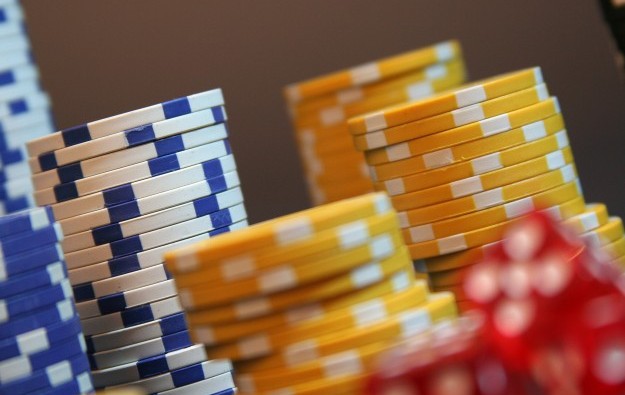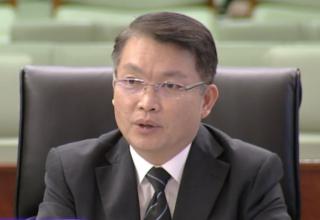Macau slowdown ‘primarily’ on phone betting: Louis XIII
Dec 23, 2014 Newsdesk Latest News, Macau, Top of the deck

A Macau casino developer has stated in a regulatory filing that the market wide slowdown in the city’s gaming revenue seen during the six months to September 30 was “primarily” caused by a decline in telephone betting.
“The slowdown is coming primarily from a decline in VIP proxy phone betting caused by the increased intensity of the anti-corruption drive in China,” stated Hong Kong-listed Louis XIII Holdings Ltd in its fiscal year 2015 interim report.
The firm is constructing a luxury boutique casino on Cotai expected to open in 2016. The company’s management includes two long-term Macau industry insiders: Stephen Hung – a former banker who has acted as vice chairman of Rio Entertainment Group, which has operated the Rio Hotel & Casino in Macau through affiliates – and Walter Power, a former senior executive at Venetian Macau Ltd who helped launch the Sands Macao casino property.
Market wide in 2014, year-on-year growth in Macau gross gaming revenue (GGR), i.e. VIP and mass market combined, has gone from an increase of 10.6 percent in April to a 11.7-percent decline in September – the period covered by Louis XIII’s interim report.
The city’s accumulated gross revenue in 2013 was MOP360.75 billion (US$45.1 billion) – a year-on-year expansion of 18.6 percent, according to the local regulator, the Gaming Inspection and Coordination Bureau. This year, the market is expected to be flat.
Analysts Jamie Soo and Adrian Chan from Daiwa Securities Co Ltd in Hong Kong said in a note in November that – based on conversations with junkets and other industry participants – phone betting accounted for around 8 percent of annual VIP betting revenue in Macau. VIP play in turn generally accounts for 60 percent or more of all Macau GGR.
Numbers game
If Louis XIII Holdings’ analysis of the causes of the local casino industry’s slowdown is correct, then the telephone betting component of VIP play could be significantly higher than 8 percent.
But a specialist in gaming law recently told us: “How can anyone really know the amounts involved in proxy betting in Macau without asking every junket operator? Even then, would they necessarily share that information?”
On October 29, GGRAsia broke the news that Sands China Ltd had decided to ban junket operators from running telephone betting in VIP rooms in its Macau properties. GGRAsia has subsequently heard from industry sources that at least one other Macau casino operator has taken similar action.
Although neither Sands China nor its parent Las Vegas Sands Corp linked the decision to ban phone betting in Macau with pressure from any particular jurisdiction, it has been widely assumed in the industry that if any pressure had been applied, it was likely to have come from the U.S., rather than Macau.
Proxy betting appears to be something of a grey area legally in Macau. Some casino operators appear to have tolerated situations in which off-site players phone in their bets to a junket agent present at the table, while others have barred it. GGRAsia also understands from a second set of industry sources that the gaming bureau has not so far actively sought to ban this practice in Macau because of the ‘grey’ nature of it.
“There is a prohibition in Macau law 16/2001 on interactive gaming,” the specialist in gaming law told GGRAsia. “That’s defined as entering in and participating in a game using a telecommunications device,” added the specialist.
“But the thing about proxy betting is that the person that is on the other end of the phone [the gambler] isn’t participating in the game. All he’s doing is instructing the person who is participating. So effectively – in Macau – that activity is getting around that prohibition,” added the person.
But comments by China’s President Xi Jinping during his visit to Macau last week – calling on Macau to “strengthen and improve regulation and supervision over the gaming industry” – combined with new secretaries announced this month for all major government portfolios in Macau, suggests some aspects of gaming regulation in Macau might be put under review.
“The practice of proxy betting is completely damaging to a jurisdiction’s anti-money laundering (AML) regime, because you have no idea who is actually placing the bets,” the gaming law specialist added.
“All you know is what’s happening on the table. You might get some high value transaction reporting, but that will only record the fact that the proxy has been handling an amount of money above the reporting threshold in a 24-hour period,” said the person.
In Macau the threshold for automatic reporting of transactions made by one person in a 24-hour period is high by international standards, standing at MOP500,000 (US$62,600).
It has previously been reported that in order to facilitate proxy play, Macau junkets – during the recent boom years of industry growth – expected a telephone player to roll approximately six times that – namely HKD3 million – per session.
Related articles
-
 Court reduces Tak Chun boss prison...
Court reduces Tak Chun boss prison...Jan 12, 2024
-
 Casino island Jeju drops remote betting...
Casino island Jeju drops remote betting...Aug 22, 2023
More news
-
 GKL provides its new table game...
GKL provides its new table game...Nov 22, 2024
-
 The Baron Upright, a new cabinet from...
The Baron Upright, a new cabinet from...Nov 22, 2024
Latest News
Nov 22, 2024
Casino operator Grand Korea Leisure Co Ltd (GKL) says it has achieved its first commercialisation of a new-to-market table game, developed via an in-house competition dating to 2021. Grand Korea...Sign up to our FREE Newsletter
 (Click here for more)
(Click here for more)
Pick of the Day
”As we navigate the final steps of the licensing process, we remain confident in our ability to align with Brazil’s regulatory requirements”
Eusebio Tanco
Chairman of DigiPlus Interactive
Most Popular
 Macau to get 36mln visitors in 2025: Secretary Lei November 21, 2024
Macau to get 36mln visitors in 2025: Secretary Lei November 21, 2024  Gaming technology firm IGT reports hacking incident November 21, 2024
Gaming technology firm IGT reports hacking incident November 21, 2024  EBITDA a focus in Macau market share battle: Jefferies November 21, 2024
EBITDA a focus in Macau market share battle: Jefferies November 21, 2024  Macau 2025 GGR could top US$30bln govt forecast: Citi November 20, 2024
Macau 2025 GGR could top US$30bln govt forecast: Citi November 20, 2024  Future of gaming is the online format: Pagcor chairman November 20, 2024
Future of gaming is the online format: Pagcor chairman November 20, 2024









